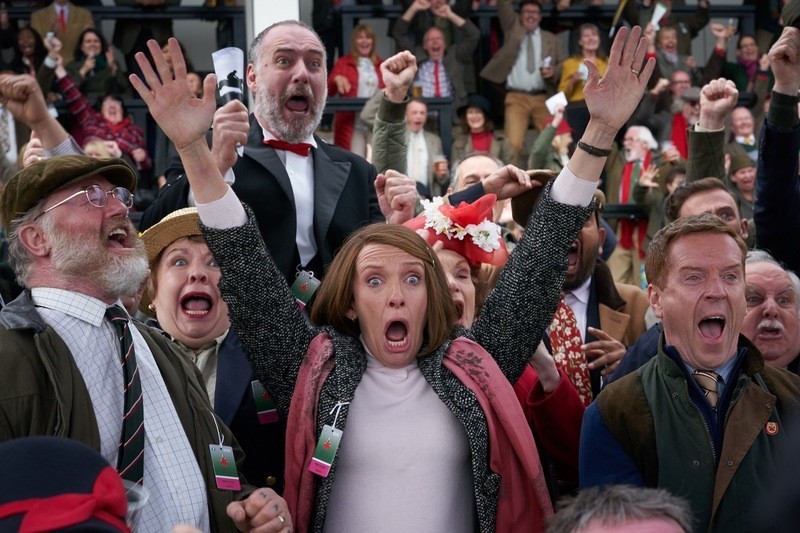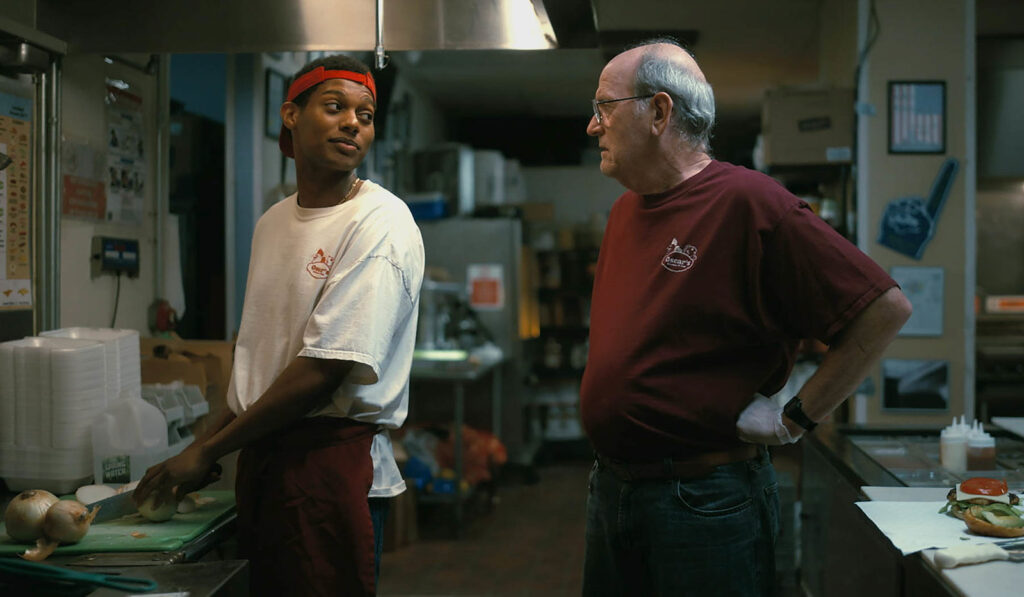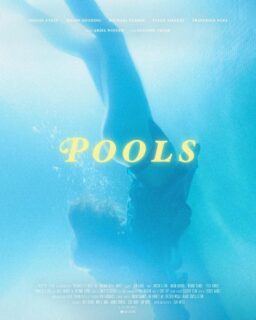Richard Jenkins gives one of his most soulful performances in years in Andrew Cohn’s “The Last Shift,” a drama about one man’s devotion to his job, and the ways in which is employer takes advantage of his pride. From when we first see him—crafting a chicken specialty he calls the “Stanwich”—Jenkins’ everyman quality is put to great use as a worker of 38 years at Oscar’s Chicken & Fish. He moves slowly but precisely, and remains focused on taking care of Oscar’s at night, and all the customers who roll through. In one of its fine melancholy touches, the movie catches Stanley in the last week of his time at Oscar’s, as Stanley is set to leave at the end of the week and take care of his ailing mother down in Florida. With beautiful ease, Jenkins illustrates the kind of hard worker we often see in Ramin Bahrani films, and that includes his Sisyphean pursuit of making good fast food every night.
Shane Paul McGhie enters the picture as Jevon, a young father newly out of jail, and a former columnist who stopped writing, who starts work at Oscar’s as part of his probation. As the two share some compelling scenes in the quiet restaurant, they gently clash over ideas of work that might be described as generational—Stanley’s pride in his work has left him unaware of how much money he is not being paid for his continuous labor, something that Jevon brings to his attention with an exhilarating clarity. Oscar’s kitchen proves to be a cinematic setting for these dialogue-driven scenes to take place, as condiments and other items on the shelves pop, as if they were all colors that jack-of-all-trades, master-of-none Stanley could use at any time. Jenkins and McGhie hold the film together through its ups and downs, and embody two characters who prove that they have a lot to offer the world.
The excitement of seeing a movie stand up for people like Stanley and Jevon then clashes with the film’s dialogue about race, which amounts to little more than white noise. It’s hard to take “The Last Shift” in full sincerity when it starts to pit Stanley and Jevon against each other about race and privilege, since Jevon is written as one of the most stereotypical characters at the festival—does he need to be fresh out of jail to find his way into Stanley’s kitchen? The story goes even further in creating a deep bias within Stanley, which includes reckoning with a disturbing event from the past that he talks about with his friend Don (Ed O'Neill), but this narrative pursuit comes off as sloppy, and needless.
The emotional journey of “The Last Shift” eventually reverts back to putting the audience’s emotions into Stanley’s unfair treatment as a hard worker, and that’s where its storytelling passions most resonate. Cohn’s script is especially poignant, and my audience’s reaction was tellingly vocal when Stanley sees the restaurant’s parting gift.

Do you want scenes of crowds cheering? Do you want underdogs? Do you want different members of a small town coming together, and finding a new passion in life? “Dream Horse” offers these cheap but timeless thrills and more, so much that the image used to promote the movie (posted above) could have been its sole piece on a vision board. On top of that, if you keep it in mind while watching this film from director Euros Lyn, it’s a considerable spoiler.
And yet—this is the kind of unabashed crowd-pleaser that was made with care, down to a Toni Collette performance that sells every up and down experienced by her character Jan, who decides to the breed a race horse. The movie also has plenty of gorgeous establishing shots for the small Welsh village that she lives in, creating a sense that this movie can be as concerned with composition as much as having fun with a story that was told in the 2015 documentary “Dark Horse” (which also played at Sundance).
Jan is a grocery store employee who decides to breed the horse as a way to make some money, but also to find a new passion to care about. Joined by her husband Brian (Owen Teale), she rallies a batch of people from the town to throw in, making for broad humor and rag-tag team-building scenes. Jan also receives a lot of help from a former racehorse syndicate leader named Howard (Damian Lewis), who guides them and their horse Dream Alliance into the high-stakes world of horse racing.
Lyn has a sturdy vision for such a movie that balances feel-good highs and expected lows, and also when it comes to sprucing things up a bit—attaching a camera to the side of Dream Alliance during a race is a nice little jolt of energy, and the race scenes as a whole garner some significant momentum. It’s more that the story always feels like it’s on automatic. “Dream Horse” also goes for the easy laughs, like Karl Johnson playing the town drunk whose antics are constant but actually very lonely and sad. And then there’s Lewis’ Howard, who is given a subplot about a gambling problem, of which the movie more or less carelessly supports by the end for the sake of a flat-out victory.

One of the more baffling movies that I saw in Park City was Michael Almereyda’s “Tesla,” a type of philosophical celebration of perhaps the most overlooked inventor in history. Ethan Hawke stars in the movie as Nikola Tesla, eschewing any Serbian accent and free-wheeling through a movie that starts off with gliding around on roller skates.
Premiering just months after Alejandro Gomez-Rejon’s similarly focused “The Current War,” “Tesla” escapes the shadow of focusing on different time periods by leaning entirely into the artifice. It’s not uncommon for the movie to break into a slide show of Google searches, and it’s not all that surprising when Kyle MacLachlan’s interpretation of Thomas Edison whips out his iPhone, or that Jim Gaffigan seems to have just walked on set to play George Westinghouse. Scenes are created using painted backdrops, and often take place in bars, or modern bistro spots, as if parodying one’s expectation for how such historical scenes should be recreated. This looseness provides a strong contrast to the dialogue-driven script, which is meticulous all the way through Eve Hewson’s professorial narration.
Seemingly inspired by a lot of Tesla knowledge, depressants, and a desire to break free from period piece constraints, “Tesla” is for people who don’t want biopics to take us from a cradle to grave, but instead work through different life sequences as if it were a musical. It’s a tricky movie, and one that did not hold my amusement the further into its historical abyss it went, but it does have memorable moments borne from its lack of giving any care to playing by the rules. Its greatest might be when Ethan Hawke, in full Tesla costume, does a dive bar karaoke version of Tears for Fears’ “Everybody Rules the World,” off-key baritone singing and all. But with this baffling choice among others, “Tesla” proves to be a completely liberated biopic, so much so that it’s out of reach.












